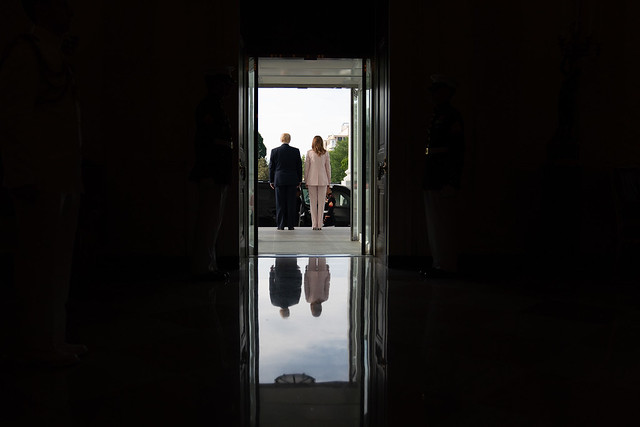
President Donald Trump’s position on the value of the US’s alliances predated his inauguration. Recently,
Uri Friedman drew attention to Trump’s consistency on this issue. Australia’s newly re-elected Coalition government might find itself at a critical juncture in the history of the postwar alliance system and be forced to question some truisms of national security.
That Trump might destabilise the US’s system of alliances
was recognised early in his candidature. Previously, US policymakers were concerned about losing the global access provided through alliances because of
external developments and not because of the US’s own policies.
The RAND Corporation’s
Stacie Pettyjohn has pointed out that Trump’s approach to alliances is not simply increased burden-sharing. Historically, alliance nations hosting US forces have been treated ‘as partners who provided bases because of shared interests and oftentimes values’. By contributing direct and indirect support, including essential infrastructure and services such as hospital treatment, and forgoing rents, allies helped defray the costs of US basing.
Trump favours treating ‘US partners as client states that must pay for protection’. In 1987, he
complained that, ‘The world is laughing at America’s politicians as we protect ships we don’t own, carrying oil we don’t need, destined for allies who won’t help.’ In 1990, he said, ‘The Japanese have their great scientists making cars and VCRs and we have our great scientists making missiles so we can defend Japan.’ He
believes allies exploit the shield provided by the US military to grow prosperous while avoiding responsibility for their own security.
Trump’s preferred formula is ‘
cost plus 50’, whereby allies pay the full cost of basing US forces, including salaries, plus a substantial premium. There’s been a suggestion that the Trump administration would be prepared to give discounts to allies that decided to align their own foreign and strategic policies with those of the US.
Acting Defense Secretary Pat Shanahan
told Congress, ‘We won’t do cost-plus-50’, but added, ‘We’re not going to run a business and we’re not going to run a charity.’ The first test of the administration’s future intentions will come in the renegotiations of basing costs with South Korea, which are due in the coming months. It was during discussions with the Koreans on an interim funding agreement that the push for allies to pay full cost plus a premium surfaced in
a note from the president to his national security adviser. Insiders indicate that Germany and Japan are also in the administration’s sights.
Aggressive pursuit of this policy would force US allies into difficult terrain. Although Trump’s offering is more than just the provision of mercenary services, it is also that. In
The Prince, Machiavelli observed that, ‘Mercenaries and auxiliaries are useless and dangerous. If a prince holds on to his state by means of mercenary armies, he will never be stable or secure.’
It’s unclear whether the US would withdraw forces from an ally’s territory if the ally refused these terms or what the impact would be on security guarantees. Even if a state hosts US forces on a cost-plus-50 basis, it will always face the risk that the US will either stand aside for or support an antagonist that has a similar agreement with the US and perhaps pays a bigger premium.
As US forces aren’t equally distributed around Europe, for example, would European NATO states be better off contributing together to the cost of all US forces in Europe, or would states without US bases seek to push the costs on to those that host them? And if Germany or Italy had to pay cost plus 50 for US forces on their soil, would they be willing to see them deployed against Russia to defend Moldova without compensation?
A requirement to align national policies with those of the US in return for bargain-basement security would degrade allied sovereignty. Once the transaction was done, subsequent governments would find both their freedom to manoeuvre heavily restricted and their security compromised. States so compromised might be expected to join in US-led operations even if their own interests weren’t engaged.
It would be a protection racket. It would take to ridiculous lengths Trump’s transactional approach to international relations. The US would be a suzerain with a system of tributary states paying for occupying forces. Most US allies that could afford to enter into a cost-plus-50 agreement would seriously question the value it would offer. The alliance system would wither.
The
preponderance of opinion in the US is that the benefits of the global suite of alliances significantly outweigh the costs. They serve the interests of the national security of the US. That doesn’t mean Trump won’t pursue his inclination, but he would encounter strong resistance across the political spectrum.
Australian strategists place great importance on the community of US allies in the Asia–Pacific. If Japan and South Korea were to find accepting a cost-plus-50 arrangement unpalatable for reasons of security or domestic politics, and US forces based in those countries were to withdraw, the balance of power in the region would transform dramatically.
If Australia were asked to pay the full cost of US troops based here, the amount would be small, but policymakers would have to recognise that the character of the alliance with the US would be irretrievably altered. The basic nature of the role of the US will be transformed and the viability of the alliance system damaged if Trump has his way. The last shreds of the US’s postwar leadership would dissipate. The leader of the free world would have become a cross between a
condottiero and a mob boss.
 Print This Post
Print This Post